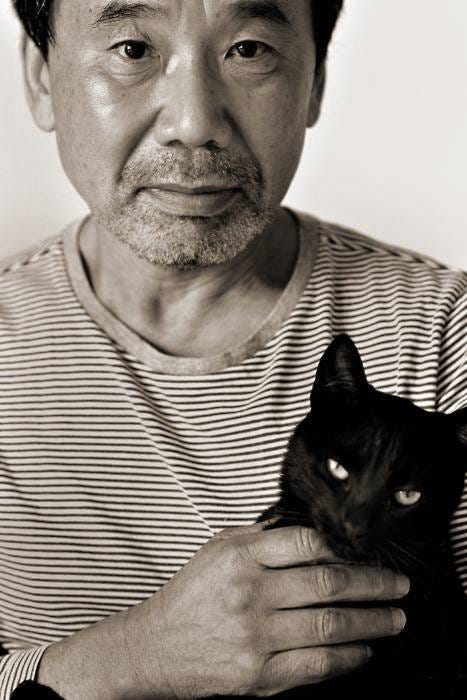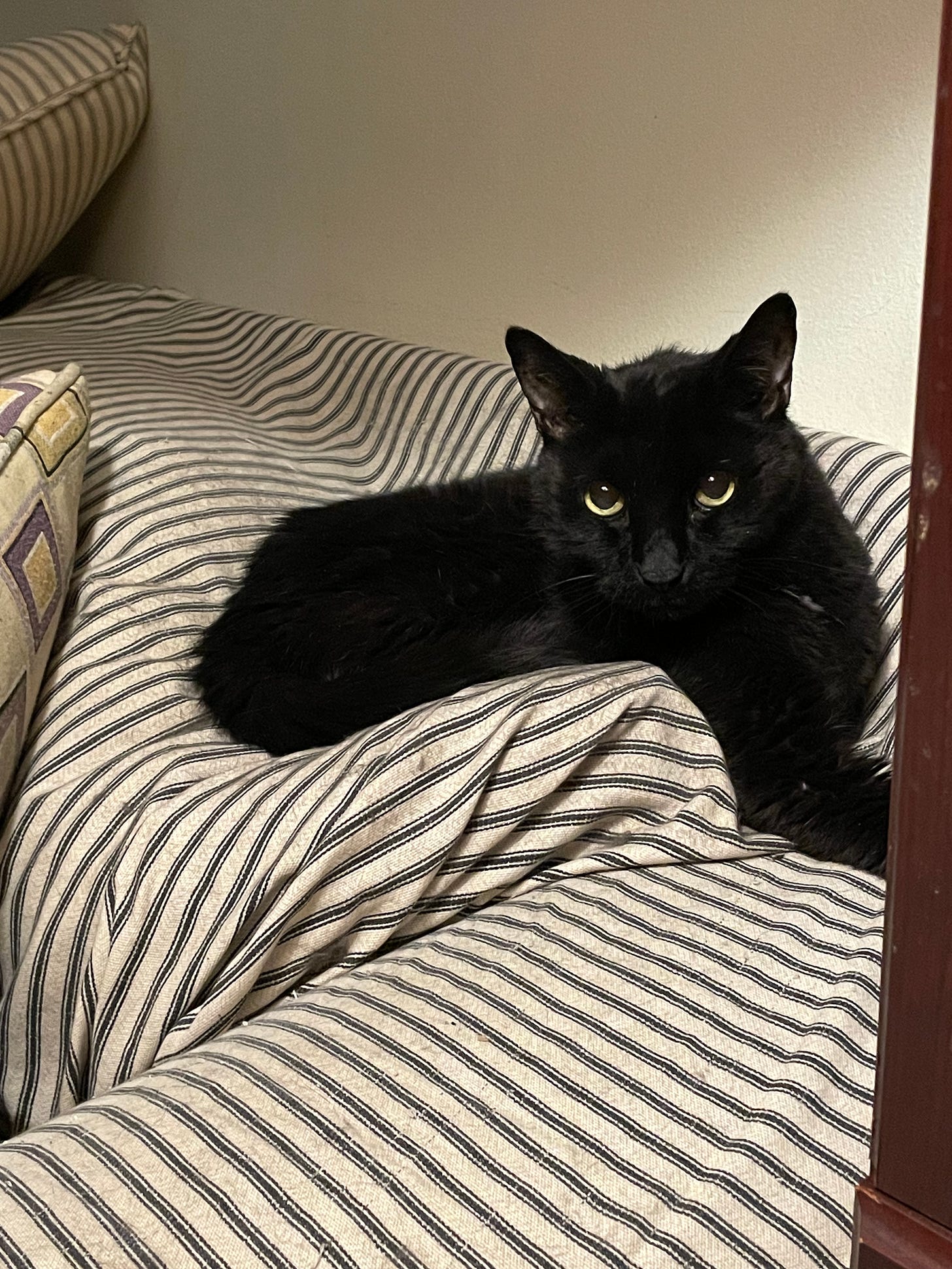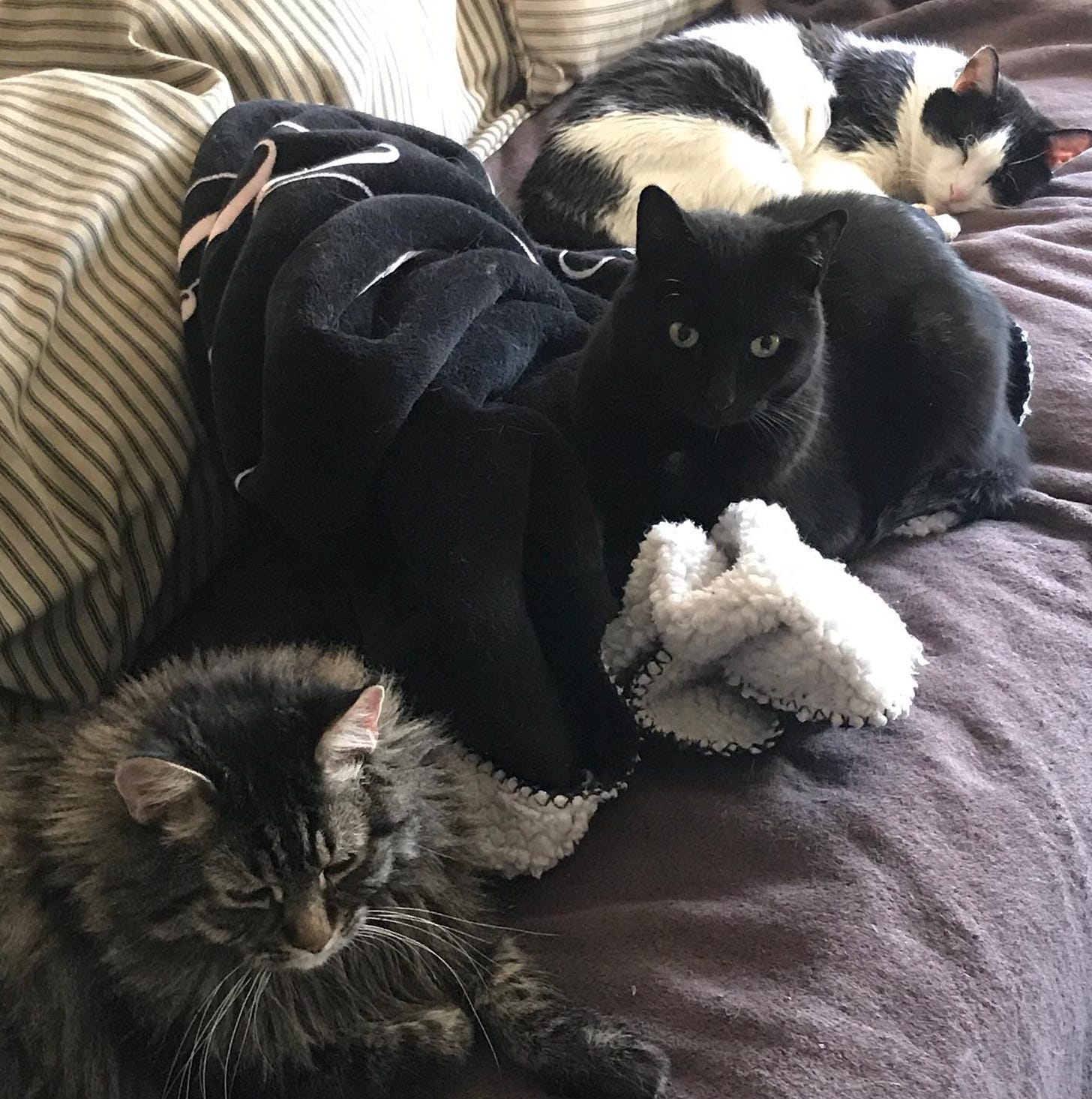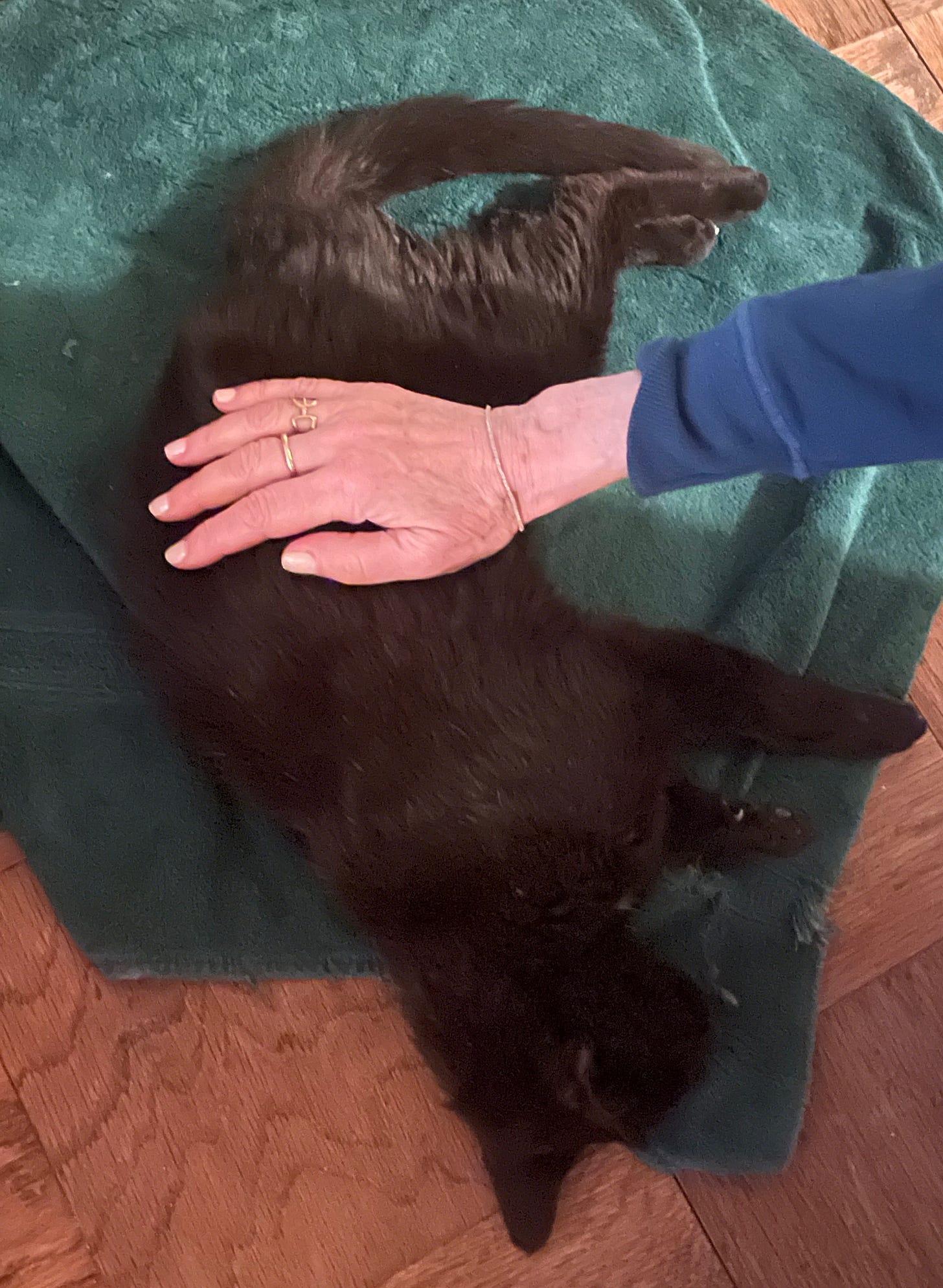he was such a haruki
Haruki had an endless supply of adorable poses (photo by twi-ny/ees)
I was not prepared to write this, but I don’t know what else to do when it comes to grief and death, which I have been writing about a lot lately.
On July 30, 2023, I posted about the death of our beautiful and sweet Norwegian Forest / Maine Coon mix, Taeko, who went peacefully in her sleep at the age of thirteen. It wasn’t long enough.
Now we are saying goodbye to our neurotic, mysterious, and unbelievably amazing LBK, Haruki, who will close his eyes for the last time any minute, leaving this world at the age of fifteen. It’s never long enough.
Taeko loved us both, but she was mostly Ellen’s cat, both of them fluffy, warm, and huggable. Haruki loved us both, as only he could, but he was mostly my kitty, like me strange, indecipherable, loyal, and — did I already say strange? He never really grew up; he was the same size his whole life, about ten pounds, and held dear to his numerous insecurities, not unlike me.
Our little boy had so many idiosyncrasies that we’d often tell him, “You’re such a Haruki.”
We got Haruki from City Critters at Petco in Murray Hill when he was just a tiny ball of fur; he was born August 8, 2008, and was originally called Dweezil but we changed that to Haruki, after one of our favorite living novelists, Haruki Murakami. Murakami often writes about cats, in such books as The Wind-Up Bird Chronicle, Kafka on the Shore, A Wild Sheep Chase, and Killing Commendatore.
Haruki Murakami and Black (photo courtesy Haruki Murakami)
In 2015, in a temporary online forum called “Mr. Murakami’s Place,” the Japanese author responded to a reader asking about how to find her lost cat by explaining, “Cats just disappear sometimes. You have to love and appreciate them while they’re near you.”
Haruki, also known as the Rukster (with a hard u, like rooster), was all black except for one small patch of white on his upper chest. He could change his appearance so suddenly that at times we wondered if he was the same cat. So many of our friends would post photos of their little black kitties, who often looked astonishingly identical to Haruki. As we black cat owners like to say, there really is only one LBK, who apparently manifests simultaneously in different places in the time-space continuum, everywhere all at once.
Some of our friends didn’t believe that Haruki existed. He would hide when anyone visited, and we wouldn’t see him for hours after they left. When we went on vacation, our catsitters thought we’d made him up because he never showed himself; if there was a Haruki, they worried, they might have killed him because he didn’t come out for food or water or even to use the litterbox for days.
Like Edgar Allan Poe wrote at the beginning of his short story “The Black Cat”: “For the most wild, yet most homely narrative which I am about to pen, I neither expect nor solicit belief. Mad indeed would I be to expect it in a case where my very senses reject their own evidence. Yet mad am I not — and very surely do I not dream. But tomorrow I die, and today I would unburthen my soul. My immediate purpose is to place before the world plainly, succinctly, and without comment, a series of mere household events.”
Such a punim! (photo by twi-ny/ees)
Every once in a while, our wonderful housekeeper, Elizabeth, would text Ellen a photo of Haruki, with lots of emojis; she was so excited that she had gotten a glimpse of him, which happened only a handful of times over the course of his entire life. It was a major intergalactic event when one weeklong catsitter, Audrey, woke up to find Haruki on the bed with her. He actually let her pet him, another rare occurrence.
Several times a day he would approach me on the bed, or on the ottoman next to my seat on the couch, meow at me, but stay just out of petting range, making me stretch to reach him with the tips of my fingers. But then he would lie down on top of me in the bed, or roll over onto his stomach on the ottoman so I could first pet him, then groom him. He particularly enjoyed being petted fast and furious from his head to his tail, two hands going quickly, one after the other, even when he got so bony these past few weeks. I could always elicit a slight meow by scritching him at the base of his spine.
He did everything very quietly: He took slow bites of food, his crunching barely audible; he had soft purrs like mourning doves; you would find one of his poops in the litterbox without ever hearing him in action, doing his business. Up until the end, it was Now you see him, now you don’t.
Haruki in one of his favorite spots (photo by twi-ny/ees)
He had his personal spots; all three cats shared one of the ottomans, but the ottoman in front of the love seat, and the love seat itself, was his, especially the little nook in the upper right corner, where his yellow eyes would peek out over a pillow or two. At home, I can be a loud sneezer, and that would set Haruki off like a shot.
As loving as he could be, he hated being picked up. It was hell trying to get him to the vet; he missed so may appointments because we couldn’t catch him — we even hired a professional cat catcher, who Haruki resoundingly defeated, making her question her chosen vocation. Our vet had to set up a Code Orange: Whenever we could catch him, we should just call them up and bring him in immediately.
Haruki lets out a sweet meow (video by twi-ny/ees)
In one memorable experience, we trapped him in the bedroom but had to take the bed apart, piece by piece, until he had nowhere to hide and we had him. We warned our vet, who was prepared with two assistants, both wearing Hazmat suits. When we opened the carrier, Haruki couldn’t have been more peaceful and submissive; the vet team thought we had made up the whole thing about how difficult it was to get him.
Black cats might be associated with evil spirits and witches, but, according to the Spruce Pets, black cats can help your love life, change color, have patterns under their fur, and resist disease. In 2018, the NIH National Library of Medicine pointed out in “The Truth About Black Cats” that LBKs are considered good luck when on a ship, can bring prosperity, and can ensure a good harvest.
The Rukster became much more friendly after he had bladder stones removed — right at the beginning of the pandemic — but afterward he was like a new cat, spending so much more time with us. He also was able to leap through a narrow space in shelving so he could hang out atop our armoire, displaying his superiority over his two sisters. And he would come onto my lap on the couch every few days, so, so tentatively, as long as I had the black blanket he liked draped over me.
It was rare to see Taeko, Haruki, and Vashti all together like this (photo by twi-ny/mdr)
One disease Haruki couldn’t resist was kidney failure. For about a month, we have been giving him special food and administering subcutaneous fluids. It hasn’t been easy to catch him, and then he wriggles away before the full dose gets into him. We don’t think we’re torturing him; he seems to understand that the reason he feels better is because of the needle and fluid. But we have one finger on the phone, ready to call the vet the instant we believe his quality of life has reached the point where it’s really over.
I canceled an appointment with a friend last night when it seemed that Haruki was on his way. I huddled in the closet with him, keeping a hand on his side, feeling for his breathing.
About an hour and a half later, Haruki secretly made his way from the front closet to under the ottoman next to the couch, where Taeko also used to hide, what we referred to as the girl cave. We usually can only see Haruki’s eyes in the dark, but now the glow is fading; I pulled him out and looked at him with longing; I thought he might have died, but then he let out a gentle purr. Ellen put her hand out and he rested his face on it.
He next crawled out and huddled on the green towel in the middle of the living room, scanning around, not quite sphinxlike. There is no riddle to answer; right now, he still seems to want to be here, still wants to be with us.
Haruki knew how to turn on the computer (photo by twi-ny/ees)
He went back to the front closet but wasn’t hiding. Ellen put her laptop there, playing a Buddhist chant that is supposed to help living beings cross over. When I checked on him right before going to sleep, I saw that he had turned around, faced the screen, and placed a paw against the computer.
It wasn’t until long after we had Haruki that we learned that Murakami had his own LBK, which he named Black. On October 29, 2015, National Cat Day, he posted a picture of his kitty along with a quote from The Wind-Up Bird Chronicle: “Holding this soft, small living creature in my lap this way, though, and seeing how it slept with complete trust in me, I felt a warm rush in my chest. I put my hand on the cat’s chest and felt his heart beating. The pulse was faint and fast, but his heart, like mine, was ticking off the time allotted to his small body with all the restless earnestness of my own.”
Saying goodbye to one of the all-time greats is not easy (photo by twi-ny/mdr)
When we woke up this morning, he was gone.
I don’t know what I’m going to do without him.
He was such a Haruki.
[You can follow Mark Rifkin and This Week in New York every day here.]








All black cats stem from Siamese, and like Siamese, have supernatural qualities. Hopefully that means they are living in a supernatural afterlife, and perhaps even come back to visit from time to time. Unseen but for the eyes, if we're quick enough to catch them. I speak from experience, having (when I was young) had a black cat whose intelligence marked her as sorcerous. Haruki sounds as if he lived life entirely on his terms. That he had that opportunity, however, was something you gave him. He may be eternally grateful (never speak for a cat), and you can be eternally proud for what you've done.
I’m so sorry for your loss, Mark and Ellen. He sounds like he was a very special cat.